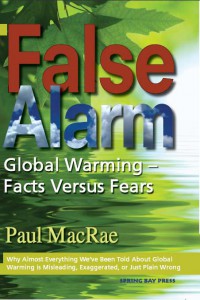Published by paulmacrae on 16 Aug 2011
Climate science’s decade of deception
In order for a democracy to function well, the public needs to be honestly informed.
—James E. Hansen(1)
By Paul MacRae
A recent Rasmussen U.S. poll found that 69 per cent of 1,000 respondents believed it at least “somewhat likely” that climate scientists had falsified their research data to support the case for catastrophic human-caused global warming (CAGW). A full 40 per cent of respondents said falsification of research data was “very likely.” Only 22 per cent were confident that climate scientists wouldn’t falsify data.(2)
This is an astonishing poll result. Is it possible that, in their passion for the CAGW hypothesis, prominent climate scientists would knowingly fudge their data to mislead the public? Surely the 69 per cent in the Rasmussen poll were innocent dupes of what global-warming activists call the “denial industry.”
Unhappily, as I discovered during more than two years of research for my book False Alarm: Global Warming—Facts Versus Fears, the 69 per cent have got it right. Over the past decade alarmist climate scientists—including the top figures in the field—have been deliberately misleading the public on many climate issues. One might even say alarmist climate scientists have developed a culture of deception, a culture that is very clear in the “Climategate” emails.
Blatant dishonesty
Among many deceptions—too many to deal with here—one is particularly blatant. For more than a decade, the public has been bombarded by claims that the planet was not just warming but experiencing “accelerated”, “unequivocal,” “unprecedented” and “dangerous” warming. Yet the actual temperature record shows that during the past decade, on average, there has been little or no warming.
Only recently, faced with a gap between the climate reality and alarmist theory that was too great to ignore, has official climate science begun to admit the facts to the public.
And so, in June, the prestigious journal Proceedings of the National Academy of Sciences (PNAS) published a peer-reviewed article that began: “Data for global surface temperature indicate little warming between 1998 and 2008. Furthermore, global surface temperature declines 0.2 °C between 2005 and 2008.”(3) (As we will see below, the cooling trend has continued past 2008 despite a warm, El Nino-influenced 2010.)
Early in August, a press release from the British Meteorological Office admitted there had been no warming—the Met delicately called it “a pause in the warming”—in the upper 700 metres of the world’s oceans since, get this, 2003.(4) Yet, for the past eight years, the Met has warned the public about a dangerous heating up of the oceans. Continue Reading »

